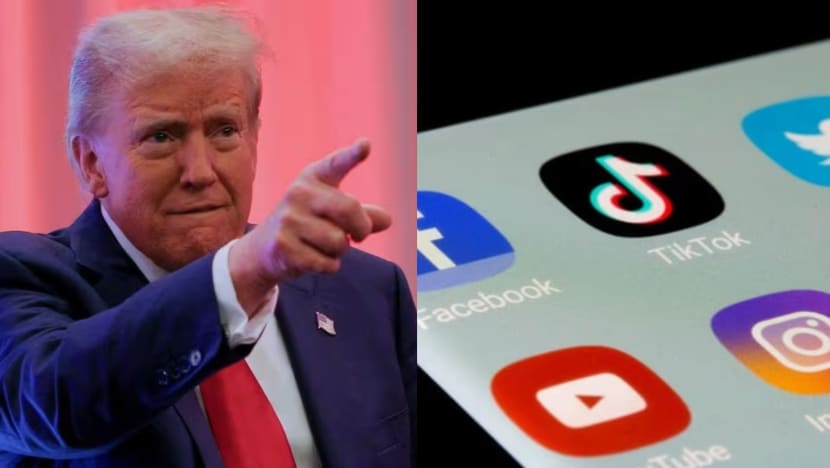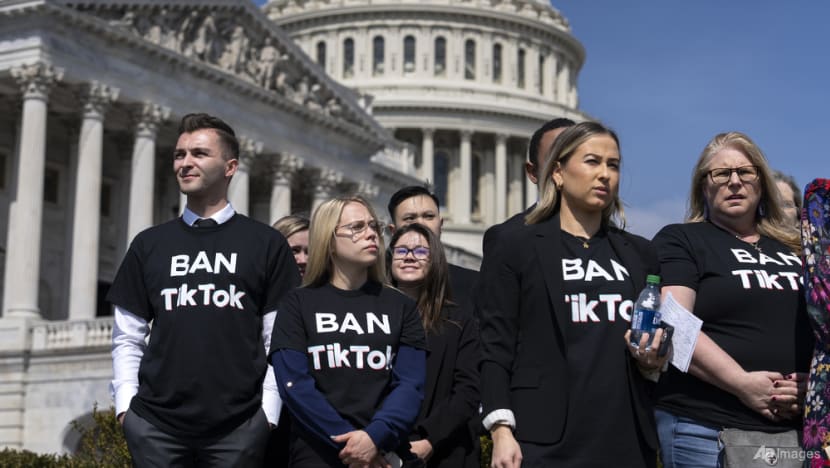Commentary: Could Trump save TikTok from US ban, as he promised?
The United States may have passed a law to ban TikTok unless Chinese owner ByteDance sells it, but incoming president Donald Trump has promised to “save” the app. NTU’s Mark Cenite considers the possible scenarios.

Composite photo of US president-elect Donald Trump and the TikTok app seen on a smartphone with other social media apps. (Photos: Reuters/Brian Snyder, Dado Ruvic)

This audio is generated by an AI tool.
SINGAPORE: The deadline for ByteDance to sell TikTok or face a ban is Jan 19, 2025 – one day before Donald Trump’s inauguration. Having vowed to “save TikTok” on the campaign trail, the big question now is how the next United States president might do it and if he can.
Many in Singapore will recall TikTok’s CEO Chew Shou Zi facing off with Republic senator Tom Cotton earlier this year. “I’m Singaporean,” he repeatedly answered, when asked if he holds a Chinese passport or is a member of the Communist Party of China.
A concern widely shared among American lawmakers is that ByteDance is subject to Chinese law requiring cooperation on intelligence and national security matters and could be forced to use its popular video app and user data for nefarious purposes.
In April, President Joe Biden signed a law that bans TikTok if ByteDance does not sell its American operations to a company that is not controlled by a nation deemed a “foreign adversary”.
Legislation that Congress passes is, of course, still binding even if there’s a change in the presidency. But TikTok’s future in the US remains uncertain, with several possible scenarios.
SCENARIO 1: A PARTIAL SALE WITHOUT TIKTOK ALGORITHM
Beijing has said it would oppose a forced sale, which it characterised as “bullying”. Recently passed Chinese export controls restrict the transfer of technology like the algorithm that powers the social media platform.
Assuming the sale of the TikTok algorithm is off the table, an alternative deal could entail selling other assets, including user data, but not the core technology.
This may be the least likely scenario. TikTok without the algorithm is like a sports car without an engine – a far less attractive investment.
TikTok’s likely price tag would put it beyond the reach of all but a few potential buyers, and those like Meta, which already own related businesses, could face antitrust challenges.
SCENARIO 2: COURTS OVERTURN BAN ON FIRST AMENDMENT GROUNDS
It’s possible that Trump may not need to act to get his preferred outcome.
TikTok has challenged the ban’s constitutionality in an appeals court – on the basis that it infringes on free expression. It’s an unusual case: A company with Chinese roots arguing for Americans’ First Amendment rights, with the US Department of Justice defending the potential ban of an app that half of Americans use.
Government lawyers have asked the court for a December decision to allow time for appeals before the January deadline. If litigation drags on past Trump’s inauguration, the Justice Department under the new administration could drop its defence of the law.
If the legal challenge lands at the US Supreme Court, there’s no need to invoke accusations that the conservative majority may overturn the ban based on political considerations. Plenty of free speech jurisprudence supports a sceptical view of the ban.
SCENARIO 3: REPEAL OF THE “SALE-OR-BAN” LAW
If TikTok’s legal challenges fail, a ban is still far from inevitable.
The Trump administration could attempt to rally lawmakers to amend or repeal the law. Overturning legislation isn’t a trivial matter. Both houses of Congress would have to pass any changes.

Though Republican majorities will control both the Senate and the House of Representatives come January, and deference to Trump is high, a repeal could create an awkward test of loyalty. Ardent Trump supporters, including his choice for Secretary of State, Senator Marco Rubio, were outspoken in arguing for the law.
Trump enters office constitutionally limited to one final four-year term. In contrast, lawmakers seeking re-election in the years ahead may suffer for flip-flopping at Trump’s whim.
SCENARIO 4: NON-ENFORCEMENT
President Trump could instruct the Justice Department to hold off on enforcement of the ban. Although a presidential administration has broad discretion to set federal law enforcement priorities, ignoring recently passed legislation – with robust bipartisan support – would be a controversial move.
The ban would prohibit app stores from allowing users to download the app. So a non-enforcement policy would create legal uncertainty for stakeholders like Apple and Alphabet.
The law appears to allow some leeway to delay or avoid enforcement. Trump’s team could exploit an apparent loophole and argue that TikTok’s efforts to insulate Americans’ user data from ByteDance’s control mean it is no longer “controlled” by a foreign adversary.
CHANGING TIDES
What happens next is difficult to predict. But the political will to enact a TikTok ban appears to have waned. In August, a Pew opinion poll showed support for a ban has fallen to around one-third of Americans, down from a peak of one-half over a year before.
Since then, TikTok has become more ingrained in Americans’ lives. Biden’s campaign had an account even as the president was signing the legislation. Vice President Kamala Harris’s and Trump’s campaigns were both active on the platform. Though it was a divisive election, so far, there have been fewer criticisms of social media platforms for failing to curb misinformation compared to previous years.
During his first term, Trump issued an executive order that would have banned the app, but the courts blocked it. He has reversed his position since March, charging that a ban would help the platforms of TikTok’s competitor Meta, which he called an “enemy of the people”. Meta’s Facebook had restricted Trump’s account for two years after the Jan 6, 2021 attack on the US Capitol.
Observers noted that his opposition to a ban came after a meeting with a Republican Party mega-donor who has a substantial investment in ByteDance. After his election, Trump spokespersons have said he would keep his promise to prevent a ban.
NO SMOKING GUN
Are Americans right not to worry about TikTok? Those with concerns appear to focus less on what TikTok has done than what it could do. Indeed, we all intuitively understand that digital data is easily transferred or manipulated.
Before the bill’s passage, US intelligence officials briefed senators on the threat that TikTok poses. Some lawmakers called for the public release of some of the content, but it remains classified.
TikTok had been working behind the scenes to address concerns about its corporate structure and data storage with a secretive US government committee that deals with foreign investments with national security implications. Government officials backed away from negotiations, saying any breaches of an agreement would be difficult to detect.
Given the scarcity of public evidence that TikTok has systematically misused user data or shared it with Chinese authorities, scrutiny has focused on hypotheticals – whether Chinese authorities could gain access to information about individual users, tweak its algorithm to paint a distorted picture of news events, or use insights about users’ interests to shape public opinion.
During the court hearings this year, appellate judges asked what could happen if US-China tensions escalated into military action. Escalation – intentional or not – doesn’t seem out of the question, given Trump’s hawkish Cabinet appointments.
It’s worth noting that just this month, Canada, a nation generally less confrontational on the world stage than its southern neighbour, ordered TikTok to shutter its Canadian offices due to “national security risks”. The authorities did not, however, restrict Canadians’ use of the app.
Though the authorities did not reveal the intelligence behind their decision, the former director of the Canadian Security Intelligence Service, David Vigneault, said it’s “very clear” that because of the app’s design, Canadians’ user data “is available to the government of China”.
Given that American political will to implement a ban appears to be faltering and possibilities to manoeuvre around it are still alive, I wouldn’t count on a ban materialising any time soon.
For better or worse, our feeds may continue to feature videos made in the USA, including those that president-elect Trump posts for his 14 million followers.
Dr Mark Cenite is Associate Dean (Undergraduate Education) at Nanyang Technological University’s College of Humanities, Arts, and Social Sciences. He teaches media law and artificial intelligence law at the Wee Kim Wee School of Communication and Information.




















